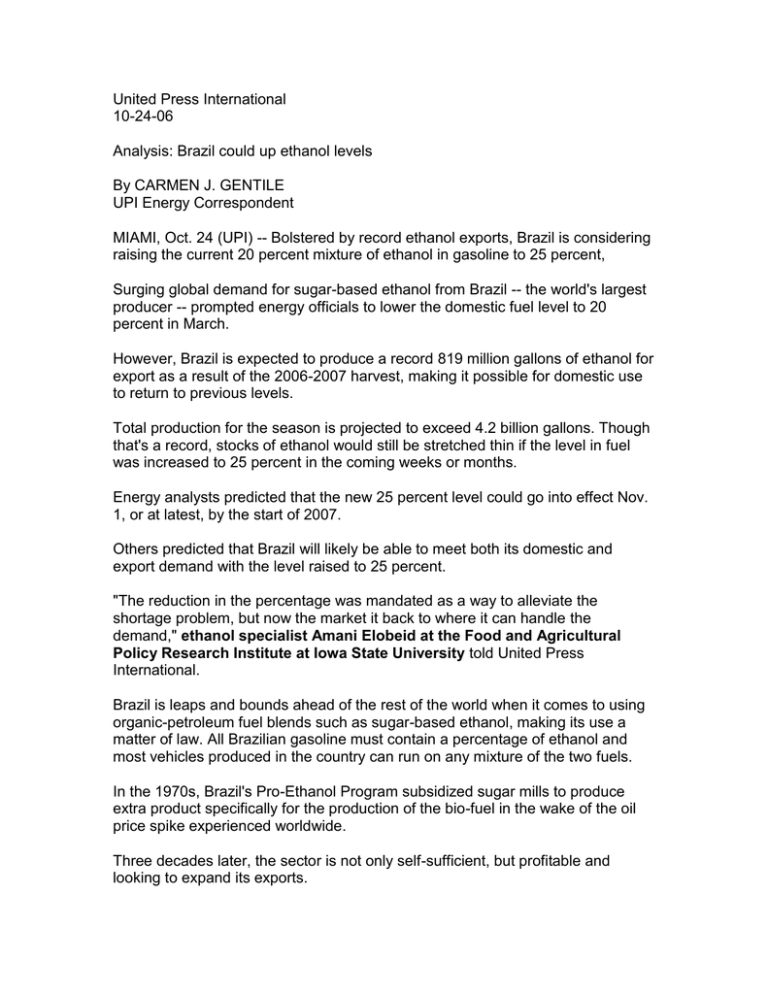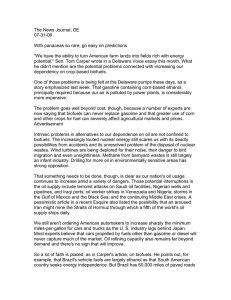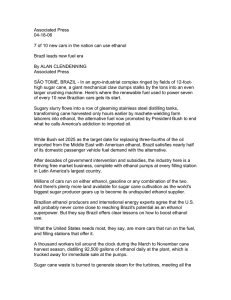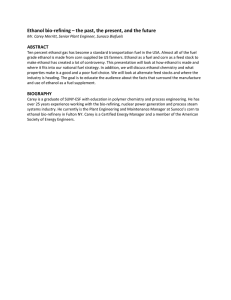United Press International 10-24-06 Analysis: Brazil could up ethanol levels
advertisement

United Press International 10-24-06 Analysis: Brazil could up ethanol levels By CARMEN J. GENTILE UPI Energy Correspondent MIAMI, Oct. 24 (UPI) -- Bolstered by record ethanol exports, Brazil is considering raising the current 20 percent mixture of ethanol in gasoline to 25 percent, Surging global demand for sugar-based ethanol from Brazil -- the world's largest producer -- prompted energy officials to lower the domestic fuel level to 20 percent in March. However, Brazil is expected to produce a record 819 million gallons of ethanol for export as a result of the 2006-2007 harvest, making it possible for domestic use to return to previous levels. Total production for the season is projected to exceed 4.2 billion gallons. Though that's a record, stocks of ethanol would still be stretched thin if the level in fuel was increased to 25 percent in the coming weeks or months. Energy analysts predicted that the new 25 percent level could go into effect Nov. 1, or at latest, by the start of 2007. Others predicted that Brazil will likely be able to meet both its domestic and export demand with the level raised to 25 percent. "The reduction in the percentage was mandated as a way to alleviate the shortage problem, but now the market it back to where it can handle the demand," ethanol specialist Amani Elobeid at the Food and Agricultural Policy Research Institute at Iowa State University told United Press International. Brazil is leaps and bounds ahead of the rest of the world when it comes to using organic-petroleum fuel blends such as sugar-based ethanol, making its use a matter of law. All Brazilian gasoline must contain a percentage of ethanol and most vehicles produced in the country can run on any mixture of the two fuels. In the 1970s, Brazil's Pro-Ethanol Program subsidized sugar mills to produce extra product specifically for the production of the bio-fuel in the wake of the oil price spike experienced worldwide. Three decades later, the sector is not only self-sufficient, but profitable and looking to expand its exports. Alternative fuels such as ethanol have experienced their own price increase in recent months due to the increasing demand for them. That's good news for Brazil's burgeoning sugarcane industry, whose small farmers and agrobusinesses are rushing to plant more fields. Earlier this year, Brazil's federal energy company Petrobras signed an agreement to carry out a feasibility study for a new $225 million pipeline to carry ethanol from the center-west state of Goia to the coastal state of Sao Paulo. The pipeline would have a capacity to transport about 1 billion gallons of the fuel annually to Petrobras' refinery where it would be mixed with gasoline. It would also create new opportunities for ethanol exports through the state's ports, Petrobras said in a statement. Brazil's development and expanded output has caught the attention of U.S. officials, who noted during an April World Economic Forum meeting on Latin America that Washington was searching for ways to "diversify" its fuel options and looking to Brazil as an example of how to do it. "We are embarking on a program to diversify our energy sources and change the mix," E. Anthony Wayne, U.S. assistant secretary of state for economic and business affairs, said in a statement. "And Brazil is a leader in ethanol production." Amid Brazil's success with traditional sugar-based ethanol, engineers there have designed and developed a new type of diesel fuel that is mixed with various vegetable oils, an innovation energy officials say will save the country millions on imported diesel in the coming years. According to Petrobras and President Luiz Inacio Lula da Silva, the new biodiesel mixture would put Brazil on the map among those nations leading the alternative fuel revolution. "Brazil can become the most important nation in the world for renewable energy," da Silva said during the new fuel's introduction in June. Unlike other forms of bio-diesel, H-Bio is mixed by the fuel distributor and not at the refinery, adding to the proposed savings, which Pertrobras said could total as much as $145 million a year once the new mixture hits the market. Fuel experts like Al Mannato, the fuels issues manager at American Petroleum Institute in Washington, says bio-diesels like the one created by Brazil certainly have their advantages. "The pro is that it's [the vegetable-based portion of the fuel] a renewable energy source," said Mannto. He also noted that bio-diesels "have great lubricity characteristics," meaning they aid in lubricating an engine while it's running, prolonging the engine's life. There are drawbacks, however, he notes, in that bio-diesels are typically expensive to produce and have a tendency to gel in cold weather, which would make them difficult to use in winter in the colder climes of North America and parts of northern Europe.




